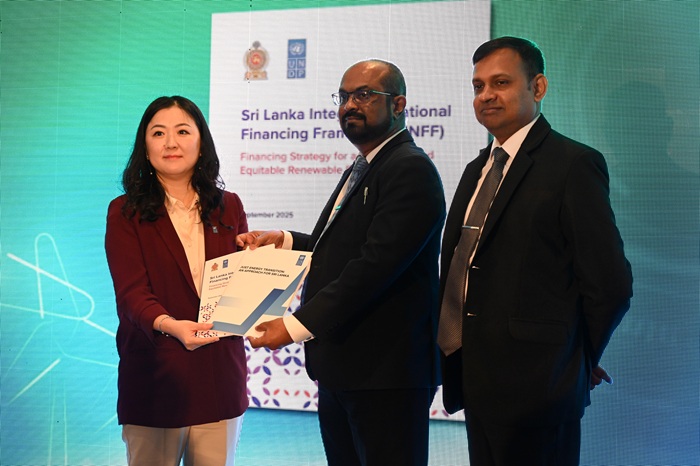
The Sri Lanka Integrated National Financing Framework (INFF) Strategy for the Energy Sector, developed through a process led by the Ministry of Energy with support and technical expertise from UNDP in Sri Lanka, and the Just Energy Transition (JET) Study, was launched during an event in Colombo recently.
The INFF, which outlines how Sri Lanka can shift to renewable energy in a fair, inclusive and equitable manner, was launched during the Renewable Hydrogen Stakeholder Consultation Workshop: From Strategy to Actions held recently.
The Ministry of Energy, together with the Sri Lanka Sustainable Energy Authority and the United Nations Development Programme (UNDP) in Sri Lanka, hosted the workshop, bringing together national policymakers, private sector leaders, financiers, academia and international experts to discuss the country’s pathway towards a green hydrogen economy.
The workshop presented Sri Lanka’s National Renewable Hydrogen Policy, which provides a framework for positioning the country as a future regional hub for hydrogen and its derivatives. With its vast renewable energy resources, Sri Lanka is well placed to leverage hydrogen technologies for decarbonising power generation, industry and transport, while enhancing energy security and attracting international investment.
Senior government leaders underscored Sri Lanka’s commitment to sustainable energy development. Prof K.T.M. Udyanaga Hemapala, Secretary to the Ministry of Energy, emphasised, “This policy framework is more than an energy plan; it is a vision for Sri Lanka’s future. By embracing renewable hydrogen, we are taking a decisive step towards energy independence, industrial competitiveness, and climate resilience.”
Reinforcing this message, Prof. Wijendra J. Bandara, Chairman of the Sri Lanka Sustainable Energy Authority, stated, “Our role is to ensure that the policy translates into practical solutions on the ground. From enabling infrastructure to safety standards and governance mechanisms, we are committed to building a robust ecosystem that allows hydrogen to flourish as part of Sri Lanka’s clean energy mix.”
The event also served as the launch platform for the Integrated National Financing Framework (INFF) Strategy for the Energy Sector, which is the culmination of two years of consultations across government, the private sector, development partners and academia. With technical collaboration from UNDP, the INFF provides actionable recommendations for mobilising and aligning diverse sources of finance, domestic and international, public and private, to advance an inclusive and equitable renewable energy transition in Sri Lanka.
Alongside this, the event also saw the launch of the Just Energy Transition (JET) Study, which provides a holistic assessment of how Sri Lanka can transition from fossil fuel-based systems to renewable energy in a way that is fair and inclusive. Developed through stakeholder consultations, the study outlines strategies to ensure that vulnerable communities, workers in traditional energy sectors, and future generations benefit from the transition. By addressing inclusivity, employment, gender equality, economic resilience, community engagement, and fiscal stability, the JET approach outlines alignment of climate action with broader social and economic priorities, fully integrating the transition with the Sustainable Development Goals.
Highlighting the transformative potential of hydrogen, Ms. Marina Ten, Officer-in-Charge, UNDP in Sri Lanka, noted, “Renewable hydrogen can be a game-changer for Sri Lanka, helping reduce emissions, diversify energy sources, and drive industrial growth. UNDP is proud to work alongside the Government and stakeholders to translate this policy into real-world actions that benefit people and planet.” Speaking on the importance of the financing framework, she added, “The INFF is about connecting ambition with resources. It helps countries like Sri Lanka unlock and align the financing needed to achieve national development priorities and the Sustainable Development Goals. Today’s launch is a milestone in building a just, inclusive and sustainable energy future.”
Speaking on the Just Energy Transition Study, she added, “The JET study ensures people remain at the centre of this transformation, providing practical pathways for a fair and equitable shift to renewable energy. Taken together, these three initiatives provide Sri Lanka with the tools to drive innovation, attract investment, and deliver a clean energy transition that leaves no one behind.”
With the simultaneous launch of the National Renewable Hydrogen Policy, the Integrated National Financing Framework (INFF) Strategy for the Energy Sector, and the Just Energy Transition (JET) Study, Sri Lanka has laid out a comprehensive roadmap for its clean energy future. By linking technological innovation with sustainable financing and ensuring that the transition is fair and inclusive, the country is positioning itself as a regional leader in renewable energy while advancing national development priorities and global climate commitments. (Newswire)
